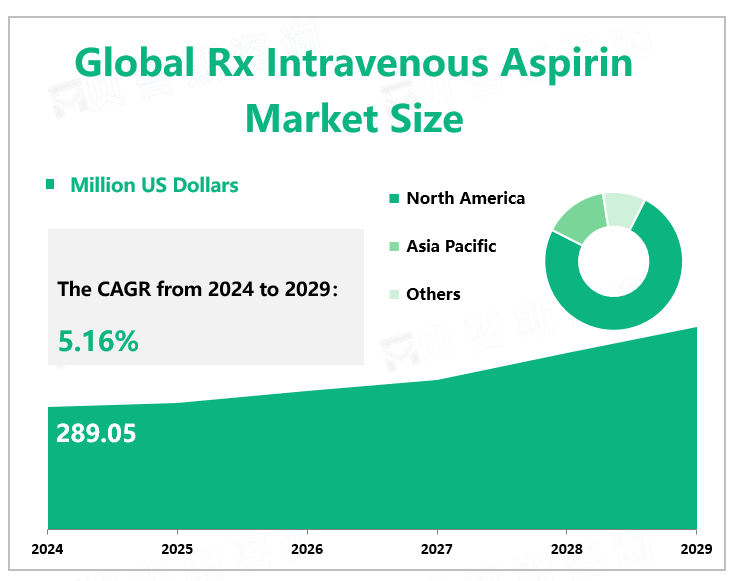Global Rx Intravenous AspirinMarket Overview
According to Global Market Monitor, the globalRx intravenous aspirin market size will reach $289.05 million in 2024 with a CAGR of 5.16% from 2024 to 2029.
Policies Support the Development of the Industry
With the development of the economy, people pay more and more attention to health. Governments of various countries continue to increase their capital investment in the medical field and have issued a series of policies to support the development of the medical industry, and continuously improve the medical system. Aspirin is included in the World Health Organization's standard list of essential medicines and is one of the essential medicines in the basic public health system. For example, the aging of the population in China is serious. Due to the decline in the physical functions of the elderly, the incidence of related cardiovascular diseases and thrombotic diseases has increased. In response to this situation, the Chinese government has issued relevant medical policies to protect the health of the elderly, and aspirin has an inhibitory effect on platelet aggregation, can prevent thrombosis, and has a preventive effect on related cardiovascular diseases and thrombotic diseases. The government's support for the medical industry will benefit the development of the industry. The government's support for the medical industry will be conducive to the development of the industry. In developed countries with mature healthcare systems, access to cutting-edge medical therapies is more likely. The use of these drugs is heavily influenced by the accessibility of hospitals, medical facilities, and qualified healthcare specialists.

Market Drivers
Aspirin is a type of salicylic acid commonly used as an analgesic, antipyretic, and anti-inflammatory drug. It can also treat certain inflammatory diseases, such as Kawasaki disease and pericardium—inflammation, rheumatic fever, etc. Administration immediately after myocardial infarction can reduce the risk of death. It can also prevent platelets from agglutinating in damaged blood vessels and has an anticoagulant effect. Long-term low-dose administration to high-risk cardiovascular patients can prevent heart disease, stroke, and thrombosis. Rx Intravenous Aspirin refers to aspirin that can be administered by intravenous injection. Some people may not be able to swallow or tolerate oral medications due to illness, surgery, or other medical problems, and another way to give aspirin is intravenously, which is suitable for emergency medical conditions.
Aspirin can enter the bloodstream more quickly when given intravenously than when taken orally. When acute cardiovascular events occur, such as heart attacks and certain types of strokes, using aspirin to inhibit platelet aggregation and blood clot formation may help stop additional heart or brain damage. Intravenous aspirin can provide rapid pain relief in some severe pain situations, where oral medication may be impractical or ineffective. Intravenous aspirin can be used to lower a high fever when oral treatment does not work or when an emergency fever is needed.
|
Drivers |
Advantages of Rx Intravenous Aspirin |
|
Government support to the medical industry |
|
|
Continuously develop new application areas of Aspirin |
|
|
Limitations |
Rising production costs |
|
Side Effects byAspirin |
We provide more professional and intelligent market reports to complement your business decisions.